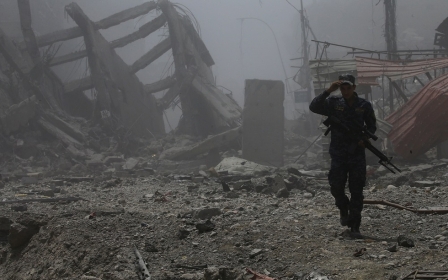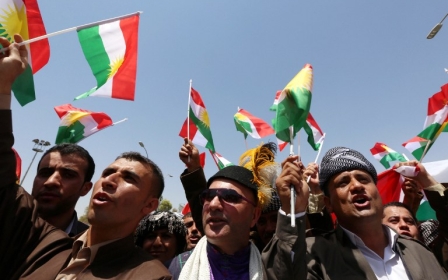Mosul execution site found as Iraqi forces accused of abuse

The discovery of an execution site near the old city of Mosul in Iraq has raised further fears among human rights activists about the scale of reprisal attacks being carried out by Iraqi forces on civilians.
According to Human Rights Watch, international observers were shown an empty building west of the Old City of Mosul where the bodies of 17 people in civilian dress were left surrounded by pools of blood.
They said that a number had been blindfolded and had hands tied behind their backs. The Iraqi security forces' 16th Division were in the area at the time of the killings, according to the international observers' source.
One senior government official in Mosul told HRW that he was comfortable with the execution of Islamic State suspects "as long as there was no torture".
The report is just the latest evidence to emerge from Mosul since victory over IS was formally declared on 10 July.
A series of videos released on social media by an Iraqi activist named Salah al-Imara appeared to show Iraqi forces beating and humiliating civilians in Mosul.
One video appeared to show soldiers beating a prisoner before throwing him off a cliff and then shooting him, according to HRW.
HRW also reported that Iraqi forces were forcibly moving dozens of women and children to a tent camp near Mosul described by authorities as a "rehabilitation camp."
The camp is 20km east of Mosul, houses at least 170 families, and is set to provide "psychological and ideological rehabilitation" for IS family members.
Repeated reports of abuse carried out by Iraqi forces has led to sharp criticism of Iraqi Prime Minister Haider al-Abadi by rights groups who cite his failure to reprimand any Iraqi soldiers.
"As Prime Minister Abadi enjoys victory in Mosul, he is ignoring the flood of evidence of his soldiers committing vicious war crimes in the very city he's promised to liberate," said Sarah Leah Whitson, Middle East director at Human Rights Watch.
"Abadi's victory will collapse unless he takes concrete steps to end the grotesque abuses by his own security forces."
Abadi formally announced the "failure and the collapse of the terrorist state of falsehood and terrorism" last week.
However, many observers have long feared that residents of Mosul - who are often collectively blamed for harbouring IS following the takeover of the city in 2014 - would be subjected to revenge attacks following the recapture of the city.
On Tuesday evening, Abadi broke his silence over the abuse reports.
"Any violation against the law or any violation against a person's dignity is not acceptable and we will chase them (perpetrators) down," he told a press conference.
"These are individual acts and not widespread and we will not tolerate such acts."
He suggested that the soldiers involved in carrying out the abuses were either "ignorant" or had struck a deal with IS "to defame us and the security forces".
Accusations of human rights abuses have been ongoing since the campaign to retake Mosul was launched last year.
Much of the focus has been on the Popular Mobilisation Units (PMUs), semi-officials battalions that have been regularly criticised for being sectarian in nature and backed by Iran.
But the Iraq army and its US backers have also been condemned for the high civilian death toll since the siege of Mosul began.
Monitoring group Airwars has estimated that there may have been 5,805 civilians killed in Mosul between February and June 2017.
New MEE newsletter: Jerusalem Dispatch
Sign up to get the latest insights and analysis on Israel-Palestine, alongside Turkey Unpacked and other MEE newsletters
Middle East Eye delivers independent and unrivalled coverage and analysis of the Middle East, North Africa and beyond. To learn more about republishing this content and the associated fees, please fill out this form. More about MEE can be found here.




